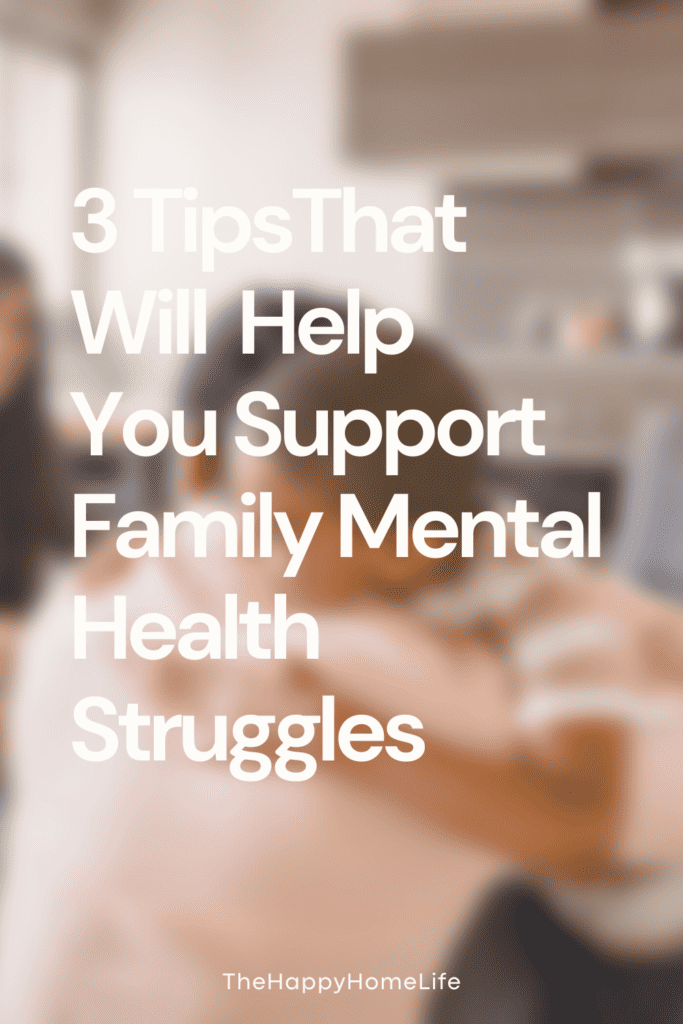Mental health is something we should all be more conscious of, especially when it comes to those around us. While you might feel fine, the people around you might be struggling, and that becomes even more concerning in a family environment.
Keeping an eye on the behavior of your loved ones will make it easier to identify when there’s an issue, and when the time comes it would be very helpful to know how you can properly support them through this difficult time,
Know that there’s no age too young to experience mental health issues and that there’s a right way to go about it if it would ever affect your partner or children. If you’re going to maintain a happy and healthy family, it’s best to be prepared for every situation.

Be approachable
The best way to make sure you’re ready to help your loved ones if they’re ever struggling with mental health difficulties is to make sure they know you’re a person they can talk to and trust.
They might need someone who they know will be discreet, and who they know will be non-judgemental. If they know that person is you, you might be the first person they come to when they’re struggling.
Being ready to communicate is always the best way to go about things, however, it’s important that you’re not too forceful with it. When struggling with things like depression and anxiety, it’s not always easy to identify what’s going on or why those feelings are present – so at first it might not seem like something is wrong to the person experiencing it.
It’s possible that being approachable from the beginning can even make it easier to prevent these difficulties from cropping up. When problems can be resolved then and there, your loved ones won’t have the chance to ruminate – and they’ll know there’s always someone on their side who is ready to listen and help if needed.
It would be even better to encourage two-way communication. Of course, leading by example is usually the best way to go about this. Be honest with your kids, don’t hide things from them, and don’t demand that they tell you things whenever you say so. You need to earn their trust, and they’ll feel more comfortable maintaining that kind of open communication with you.
Look into treatment options
Once you know whether or not your loved ones are struggling, it’s time that you start looking into the best way to handle it. For example, treatment for anxiety can be quite complex, and the best method would depend on the circumstance.
Again, it’s important that you’re not too forceful with your solutions, and your goal should be making sure you have the most realistic idea and are trying your best to persuade your loved one that they need help.
The most difficult part of dealing with mental health difficulties is admitting that there is an issue and accepting help. Conditions like depression can make taking action incredibly difficult, especially when there is no one around to support you – so it’s important that you’re understanding and ready to provide the necessary support that it will take to start treatment.

Spend more time outside
Do you find that your family is often very busy? Do you never have time to get together and go out in nature? Connecting with nature can play a significant role in improving mental health, and it can help to put things into perspective. If you haven’t had the chance to do that in recent times, it could be time for a family trip. Gather everyone, and plan your next day out. Whether you’re thinking of a hike, sightseeing, or just somewhere nice to go and spend the day – it would be good for you, your partner, and your kids.
It doesn’t even have to be a whole day trip. Instead, it could be a walk every now and then, just an hour activity that you do routinely. Getting more exercise benefits everyone, even if it’s just for a short amount every day – it doesn’t have to be strenuous.
On top of that, having an excuse to spend more time as a family can bring everyone together much easier. If someone is struggling with depression, they might shy away from these kinds of activities, but it’s not always for the best. Once they’re out and about they might enjoy it, and it’s important to take into consideration whether this is the kind of thing they would enjoy, or whether or not it would make them feel worse.
If your family isn’t active, then you can look into indoor activities as well, such as origami or crafts. You can find some origami instructions here.






